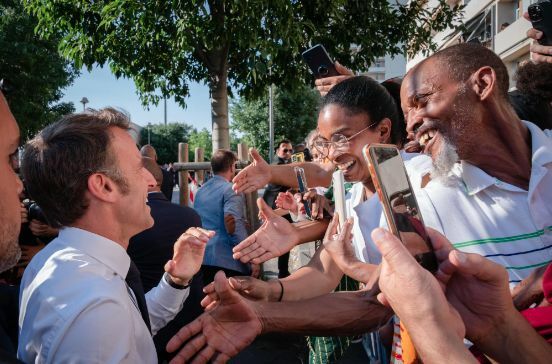Frustration boils in Marseille’s troubled neighbourhoods amid slow change

Two years ago, at the tender age of 17, Amine helplessly witnessed his sibling’s life ending in a blaze, his charred body discovered from a burnt car’s boot. His brother, who had sadly succumbed to the world of drugs and trafficking before his tragic demise, was a victim of the lawless underworld flourishing in Marseille’s most infamous neighbourhoods.
Today, at 19 years old Amine, recalls those chilling memories, surrounded by stark, rundown high-rise buildings that define his hauntingly familiar neighbourhood.
Residing in the Frais-Vallon estate, a sprawling socially disadvantaged tenement located at the city’s northern strip, Amine’s maturing years were starkly coloured by an unnerving landscape marked with gang and drug-induced violence. According to Amine, drug dealing is an irresistible temptation for many on the estate who find themselves cornered by relentless poverty and a bleak future.
Amine told BBC…
“There are no other options. No companies are coming here and saying we’ll pay you more than minimum wage… here people are supermarket cashiers or cleaners or security guards. We can’t be judges, lawyers or accountants.”
Riots that sent shockwaves recently through Marseille, leading to the rampant vandalism and loot of shops, including a firearms outlet, weren’t surprising for Amine. These unsettling clashes sparked in reaction to the fatal shooting of 17 year old Nahel Merzouk by the police in Paris. Discontentment has always been part of their life, a constant battle against miseries. He said…
“We are always in the same mess, the same misery and nothing will change, so I understand the anger of the young people. I don’t justify the violence, but I understand it.”
These riots and their repercussions have unmasked the depths of frustration, fury, and feelings of desertion experienced by French citizens.
A middle-aged woman on the estate, Mado, talked about her experiences living next to what used to be a local police station, which represented their tenuous connection with French authority. Its closure symbolises an increasing detachment. Mado said…
“It’s like living in a bin here. It’s not safe. People defecate in the lifts and stairwells. For the politicians we are nothing. We are really nothing.”
Mourad, another resident, vented indignantly about the appalling living conditions.
“We don’t all have the same rights. Politicians go on the media and say there are no second-class citizens, but it’s not true in reality.”
Amine works towards diverting local children away from crime and also extends support to bereaved families. Marseille reported 31 murders linked to drug trafficking last year. With 23 already on record this year, two-thirds of the victims were under 30 years old.
The French authorities have recognised both the tragedy and the issue. President Emmanuel Macron, two years ago, vowed to mend Marseille’s condition, proposing a financial injection of 5 billion euros (approximately 189 billion baht) to curb crime and poverty in the city. He reaffirmed his commitment recently, just before the unrest in the city. “Everything has to move faster,” he declared, during a three-day tour that took him to the sites of numerous regeneration projects.
The promises hold little assurance for Amine, who has interacted with him twice.
“When Macron comes, he comes to make announcements, not to listen to us.”
Benôit Payan, Mayor of Marseille, is aware that the onus is on him to bridge the divide.
“For too long my town has been divided between people who are poor and people who are not. Between those who are considered by the public authorities and those who are not.”
What was once a fundamental French value, égalité (equality), has now been reduced to a mere aspiration.
Latest Thailand News
Follow The Thaiger on Google News:


























